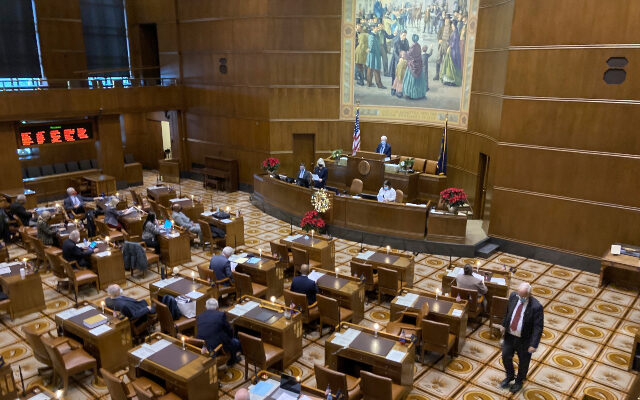Oregon Lawmakers Adjourn 2022 Legislative Session

SALEM, Ore. (AP) — Oregon lawmakers adjourned the 2022 short legislative session Friday after passing ambitious legislation, including overtime pay for farmworkers, $600 stimulus payments for low-income workers and a $400 million spending package focused on affordable housing and homelessness.
“When we first convened— and I addressed this chamber for the first time as speaker I said that, ‘I believed” that this could be the most significant short session we’ve ever had’ and I truly believed that,” said House Speaker Dan Rayfield. “Today, I want to thank all of you and the community, because together we got truly an incredible amount of work done in service of our communities and Oregonians across the state.”
Republicans, who are in the minority in both chambers, had argued that during the traditional short session lawmakers should have focused on addressing budget fixes and technical issues from the previous year.
However, Democrats remained adamant that some larger challenges needed to be addressed — including the pandemic, historic wildfires, affordable housing, access to health care and workforce disparities.
One of the bills Republicans specifically criticized for being a “big issue” they said should be addressed during long sessions that occur during odd-numbered years requires farmworkers be paid 1.5 times their normal rate once they work more than 40 hours a week.
The bill passed on party lines, but not without Republicans showing their displeasure and reserving their right to require that bills be read in full before a final vote. Parties have routinely agreed to waive the constitutional rule it in the interest of efficiency until it became a popular bargaining chip for Republicans in 2016.
However the session was seemingly less tense than previous ones — most recently September’s redistricting special session that was marked by a broken deal, GOP walkout and accusations of gerrymandering.
One considerable olive branch came when Democrats proposed $100 million for lawmakers to spend essentially as they see fit in their rural Oregon districts. The investment passed.
In addition, this session there was a wave of new leadership. The House elected a new speaker: Rayfield. The Democrat from Corvalis replaced longtime House Speaker Tina Kotek, who stepped down to focus on her campaign for governor. In addition Democratic Rep. Julie Fahey became the new House majority leader, Republican Rep. Vikki Breese-Iverson the new House minority leader and Sen. Tim Knopp is the new Republican leader for the Senate.
This session also was the final one for Senate President Peter Courtney, a Salem Democrat, who is the Oregon’s longest-serving state lawmaker with 38 years.
“He has been a legend,” said Republican Sen. Fred Girod. “And the state’s a heck of a lot better because Peter Courtney has been here.”
The session began in the midst of Oregon’s omicron surge and ended a week before the state is set to lift the statewide indoor mask mandate and nearly two weeks before the end of a two-year long COVID-19 emergency declaration .
Decreasing coronavirus-related safety measures and restrictions were noticeable in the Capitol where the public was allowed to attend the session in-person for the first time since March 2020. However both lawmakers and the public were required to wear masks in the building – a mandate that was protested Republicans.
During the session the Senate voted 18-9 to temporarily kick Republican Sen. Dallas Heard out of the building for not complying with the mask requirement and refusing to leave the chamber.
Some of the notable bills that passed this session included heat relief for vulnerable Oregonians, protections for election workers, setting up rulemaking for the private forest accord and giving nurses access to a program that provides mental health and wellness support.
In addition lawmakers passed significant spending packages, made possible by $2.5 billion in revenue that wasn’t taken into account when the state budget was passed last year.
One of the largest investments was $400 million to urgently address affordable housing and homelessness in a state that has one of the highest rates of unhoused people in the country.
Another approved spending packages is Gov. Kate Brown’s $200 million “Future Ready Oregon” workforce development plan, which aims to prioritize key populations disproportionately impacted by COVID-19 and existing disparities.



